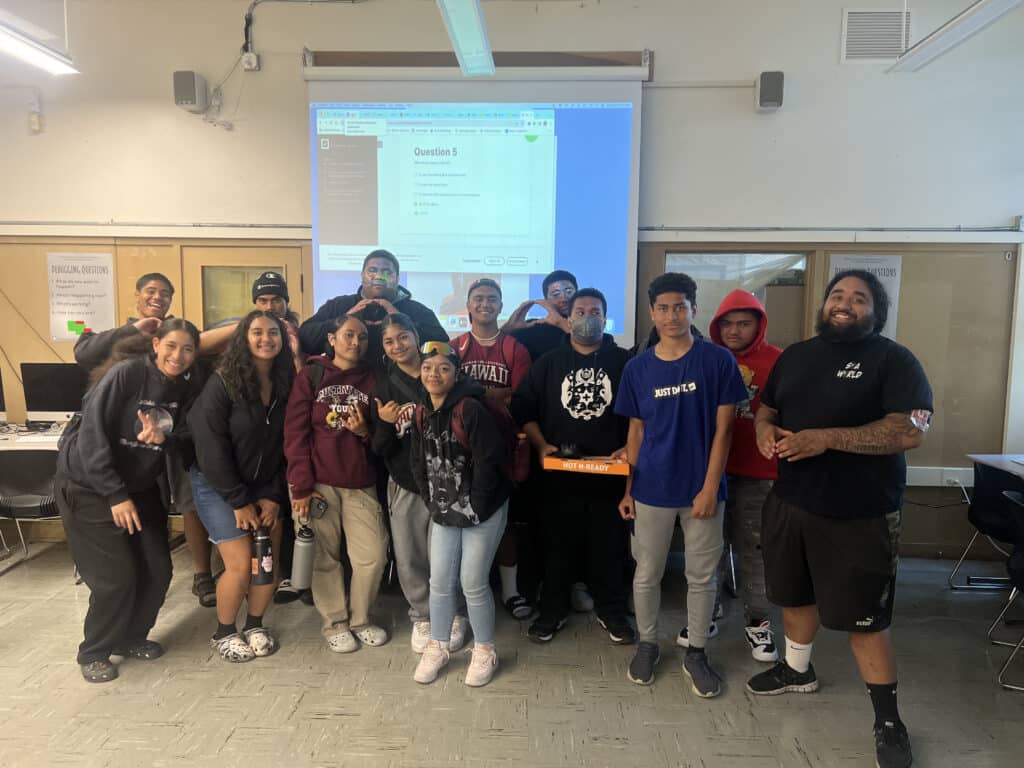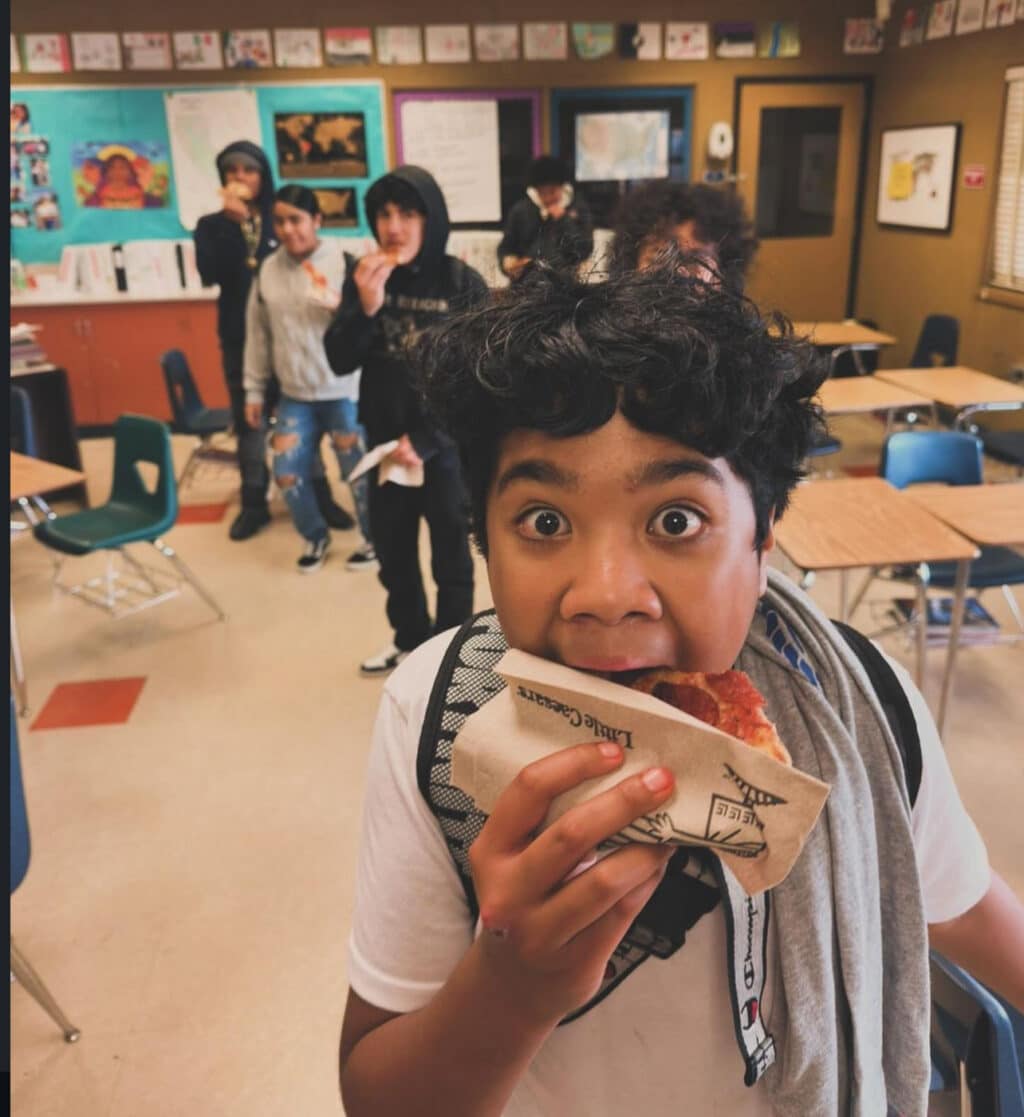This month, we had the privilege of sitting down with Alina Fa’aola, the founder and executive director of the Oakland Pacific Islander Network (OPIN). OPIN is dedicated to creating confident, high-impact Pacific Islander Leaders in every career path and industry and empowering Pacific Islander (PI) youth to thrive in every aspect of their lives.
Alina is a member of NBF’s Community Advisory Committee (CAC). The CAC is composed of AANHPI formerly incarcerated leaders, survivors of violence, and members with expertise and lived experience from grassroots organizing and leadership development. They join and provide feedback on our in-person meetings and events, build relationships with grantees and NBF staff, and help lead advising sessions. We are honored to be in community with Alina and grateful for the work she does to uplift and inspire the next generation of leaders. Here are some insights from our enlightening conversation with her.
NBF: Could you share a little bit about your experience as a CAC member and any insights you’ve learned from fellow CAC members?
Alina: Being part of New Breath’s Advisory Committee has been an incredible journey of growth. It’s challenged me to expand my approach to community advocacy. Our organization was fortunate to be a grantee of NBF’s We Got Us Fund, and I’ve learned so much from others who have been doing this work longer than I have.
One of the most valuable lessons has been understanding the broader spectrum of advocacy, especially beyond direct services. Interacting with people who have been formerly incarcerated or directly impacted by the system has reshaped my view on advocacy work. I feel more empowered to see our own roles in shaping our narrative and influencing policy. While this area is still new and sometimes intimidating for me, learning from others’ advocacy work has been invaluable. I’ve also come to see how these approaches can be effectively applied to the Pacific Islander community.
NBF: Has your involvement with the CAC influenced your work in your community and with OPIN?
Alina: I’ve realized the crucial role of networking and collaboration with the local government. In my work, it’s all about building strong relationships with our partner school districts and learning how to navigate their systems. By attending school board meetings, participating in various school site committees, and understanding the ins and outs of how the school system works to support our PI students (such as attendance teams and culture & climate teams), I’ve developed deeper relationships that have shaped and changed my perspective. I’ve learned that we have much more influence in these groups than I initially believed.
In my work, it’s all about building strong relationships with our partner school districts and learning how to navigate their systems. By attending school board meetings, participating in various school site committees, and understanding the intricacies of how the school system functions to support our PI students (such as attendance teams and culture and climate teams), I’ve developed deeper relationships that have shaped and changed my perspective. I’ve realized that we have much more influence in these groups than I initially believed.

NBF: Can you tell us a little about OPIN and what led you to start this organization? What were the initial gaps you identified that inspired the creation of OPIN?
Alina: OPIN is a grassroots organization dedicated to building purpose-driven leaders within the Pacific Islander community by providing wraparound services, programs, and resources.
The inspiration for OPIN came from the gaps we saw in school districts – specifically, the lack of guidance, mentorship, and connection between schools, their students, and families. This gap left many students struggling to graduate or have a post-secondary plan. We recognized the need for dedicated support, so we began by forming small groups to provide emotional support to youth. We observed other groups, whether by grade level or ethnicity, receiving guidance from case managers, and we realized Pacific Islander youth needed the same. OPIN then evolved to fill that role, acting as a bridge between the students, their families, and the schools.
NBF: How does OPIN aim to fill these gaps and provide better resources or services to the community?
Alina: OPIN now serves five schools, each with its own affinity group, where we deliver our youth development services. Through these programs and one-on-one sessions, we provide coaching and support for post-high school planning. We also offer various programs like Study Hall, Career Day, and other events throughout the year, all aimed at ensuring that these resources are equitable for PI youth.
Our mentorship program is tailored to meet the specific needs of the students; it’s been incredibly rewarding to receive positive feedback from parents and program alumni. It’s especially meaningful to see some of our alumni returning to support our upcoming programs, further strengthening the community we’re building.
NBF: What progress have you seen since the establishment of OPIN, and what are your future plans for the organization?
Alina: We’ve made significant progress since OPIN’s establishment, including a 100% graduation rate last year, with every student having a post-secondary plan. We now serve five schools and have introduced athletic programs to help students pursue sports at a higher level—something that hasn’t really been done before in Oakland. Establishing more of a consistent presence in Oakland represents a major step forward for us.
Looking ahead, we’re focused on expanding our youth outreach. We’re developing an enrollment form to better serve our students and currently work with 152 students from grades 6 to 12. We’re also creating PI resource centers across schools to further support our students.

NBF: What do you see as the biggest challenges currently facing the Pacific Islander (PI) community?
Alina: Our community continues to face disproportionately high rates of incarceration due to racial profiling, discrimination, and the challenges of poverty and unemployment. There’s also a severe lack of access to quality education and resources, which creates significant barriers.
These challenges are often overlooked because Pacific Islanders are grouped into the broader AAPI category despite facing distinct challenges. Growing up in Southern California as one of the few Pacific Islander families, we were often lumped into the larger Asian community and believed that “working harder” was the solution. However, I later realized hard work alone doesn’t address the deeper, systemic challenges we face. I became more aware of these challenges when I applied for college scholarships. It wasn’t until I started working with the Pacific Islander community in the Bay Area, and even more so with New Breath in 2020, that I learned how to articulate these challenges. While I’ve seen significant progress during my time in this work, the more involved I become, the more I realize how much work remains to be done.
NBF: Are there specific areas or issues within the PI community that you believe are underfunded or overlooked?
Alina: The high rate of incarceration in the Pacific Islander community deeply impacts the children I work with, especially because it affects the adults in their lives. As a youth community leader, I’m constantly thinking about how to support students who might be headed down a similar path. These challenges aren’t isolated, but part of a broader pattern, and the lack of resources in this area highlights how underfunded it is.
Another major issue is the high levels of poverty and lack of equitable resources for Pacific Islanders. I’ve seen community programs in the past that weren’t necessarily culturally competent, which is crucial when engaging with the community. When resources are offered in ways that don’t align with the community’s comfort level, they’re often rejected by the community members. However, I’ve seen creative approaches that successfully integrate culture, making resources more accessible. For example, Dr. Wesley Hingano’s dissertation, “Hella Tongan – Hella Oakland,” explores the intersections of the Tongan community’s lived experiences. I’ve also seen how events that integrate traditional dance within faith spaces have engaged the community in a positive way, making them more open to receiving support. It takes a lot of effort, but it works.
NBF: What recommendations do you have for funders who want to support the Pacific Islander community?
Alina: Invest in capacity and infrastructure building for community organizations, enabling them to thrive in today’s challenging economic and social landscape. While it’s easy to recognize the need for direct services, they won’t exist without strong grassroots organizations to deliver them. If our leaders are displaced by gentrification and can’t afford to continue their work, the cycles of poverty and incarceration will persist.
Financial support is essential, and backing our communities with funding is a direct and impactful way to make a difference. I’m incredibly grateful that New Breath’s support allowed me to go full-time, fundamentally transforming our organization and positively affecting our mental health and overall impact. With this support, we’ve been able to hire and pay people living wages, aligning their work with their heart work. To care for the community, we must also care for the organizations that serve it.
NBF: Is there anything else you would like to share with our readers?
Alina: My dream is to create a community center – a hub where our community can come together and thrive. I imagine a space with a gym for sports practice, a dance room, a café, dedicated programming areas, a computer lab, office workspaces, and conference rooms.
I encourage those who have the means to support community-based organizations to be generous. In this work, I’ve learned there are plenty of resources to go around. If we can all be generous and commit to providing what our community needs, it would make a world of difference.
Volunteering your time is another powerful way to contribute. Many community organizations serving the PI community operate without full-time staff and always need extra help. Your time and resources can make a significant impact. Local schools often have Polynesian clubs connected to community organizations, which is a great entry point.
To learn more about OPIN, visit https://www.pacificislandernetwork.org/.
–
Alina Fa’aola empowers the Pacific Islander community to walk in their purpose as the founder and executive director of the Oakland Pacific Islander Network. OPIN provides equitable services, resources, and programs to Pacific Islander youth in Oakland public schools and beyond. Alina’s work extends beyond the school system, rooted in her time as a youth pastor and director in a local church and youth ministry. From coaching volleyball, serving as a case manager to Pacific Islander students, and pioneering an organization to support Pacific students, Alina believes that every student deserves an opportunity to discover their passions, skills, and purpose beyond stereotypes. After co-founding the Oakland Unified School District’s Pacific Islander honor roll ceremony in 2017, she continues to partner with local schools to provide student-facing services and hopes to impact the greater South Pacific community.
